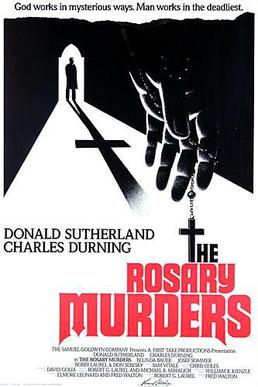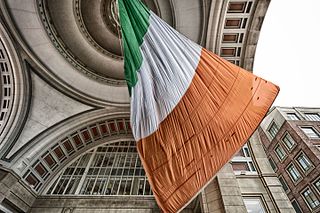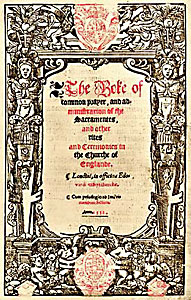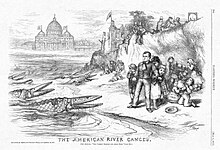
The Puritans were English Protestants in the 16th and 17th centuries who sought to rid the Church of England of what they considered to be Roman Catholic practices, maintaining that the Church of England had not been fully reformed and should become more Protestant. Puritanism played a significant role in English and early American history, especially during the Protectorate.
The Thirty-nine Articles of Religion, finalised in 1571, are the historically defining statements of doctrines and practices of the Church of England with respect to the controversies of the English Reformation. The Thirty-nine Articles form part of the Book of Common Prayer used by the Church of England and the worldwide Anglican Communion, as well as by denominations outside of the Anglican Communion that identify with the Anglican tradition.

Shema Yisrael is a Jewish prayer that serves as a centerpiece of the morning and evening Jewish prayer services. Its first verse encapsulates the monotheistic essence of Judaism: "Hear, O Israel: YHVH is our God, YHVH is one", found in Deuteronomy 6:4.

A catechism is a summary or exposition of doctrine and serves as a learning introduction to the Sacraments traditionally used in catechesis, or Christian religious teaching of children and adult converts. Catechisms are doctrinal manuals – often in the form of questions followed by answers to be memorised – a format that has been used in non-religious or secular contexts as well. According to Norman DeWitt, the early Christians appropriated this practice from the Epicureans, a school whose founder Epicurus had instructed to keep summaries of the teachings for easy learning. The term catechumen refers to the designated recipient of the catechetical work or instruction. In the Catholic Church, catechumens are those who are preparing to receive the Sacrament of Baptism. Traditionally, they would be placed separately during Holy Mass from those who had been baptized, and would be dismissed from the liturgical assembly before the Profession of Faith and General Intercessions.

John Eliot was a Puritan missionary to the American Indians who some called "the apostle to the Indians" and the founder of Roxbury Latin School in the Massachusetts Bay Colony in 1645. In 1660 he completed the enormous task of translating the Eliot Indian Bible into the Massachusett Indian language, producing more than two thousand completed copies.

James Michael Curley was an American Democratic politician from Boston, Massachusetts. He served four terms as mayor of Boston from 1914 to 1955. Curley ran for mayor in every election for which he was legally qualified. He was twice convicted of criminal behavior and notably served time in prison during his last term as mayor. He also served a single term as governor of Massachusetts. He is remembered as one of the most colorful figures in Massachusetts politics.

The Diocese of Worcester is a Latin Church ecclesiastical territory, or diocese, of the Catholic Church in central Massachusetts in the United States. The diocese consists of Worcester County. It is a suffragan diocese in the ecclesiastical province of the metropolitan Archdiocese of Boston. The patron saint of the diocese is Paul the Apostle.

The Ten Commandments, or the Decalogue, are religious and ethical directives, structured as a covenant document, that, according to the Hebrew Bible, are given by Yahweh to Moses. The text of the Ten Commandments was dynamic in ancient Israel and appears in three markedly distinct versions in the Bible: at Exodus 20:2–17, Deuteronomy 5:6–21, and the "Ritual Decalogue" of Exodus 34:11–26.

John Bernard Fitzpatrick was an American bishop of the Roman Catholic Church. He served as bishop of the Diocese of Boston in Massachusetts from 1846 until his death.

Catechesis is basic Christian religious education of children and adults, often from a catechism book. It started as education of converts to Christianity, but as the religion became institutionalized, catechesis was used for education of members who had been baptized as infants. As defined in the Catechism of the Catholic Church, paragraph 5 :
Catechesis is an education in the faith of children, young people and adults which includes especially the teaching of Christian doctrine imparted, generally speaking, in an organic and systematic way, with a view to initiating the hearers into the fullness of Christian life.

First Parish in Cambridge is a Unitarian Universalist church, located in Harvard Square in Cambridge, Massachusetts. It is a Welcoming Congregation and a member of the Unitarian Universalist Association. The church is notable for its almost 400-year history, which includes pivotal roles in the development of the early Massachusetts government, the creation of Harvard College, and the refinement of current liberal religious thought.

The Rosary Murders is a 1987 American mystery crime film directed by Fred Walton, and starring Donald Sutherland, Charles Durning, Belinda Bauer, and Josef Sommer. The plot follows a series of gruesome murders occurring within a Detroit Roman Catholic parish. It is based upon the 1979 novel of the same name by William X. Kienzle. Kienzle received screenplay credit, as did Elmore Leonard.

Education in the Thirteen Colonies during the 17th and 18th centuries varied considerably. Public school systems existed only in New England. In the 18th Century, the Puritan emphasis on literacy largely influenced the significantly higher literacy rate of the Thirteen Colonies, mainly New England, in comparison to Britain and France.

"Honour thy father and thy mother" is one of the Ten Commandments in the Hebrew Bible. The commandment is generally regarded in Protestant and Jewish sources as the fifth in both the list in Exodus 20:1–21 and in Deuteronomy (Dvarim) 5:1–23. Catholics and Lutherans count this as the fourth.

American Freedom and Catholic Power is an anti-Catholic book by American writer Paul Blanshard, published in 1949 by Beacon Press. Blanshard asserted that America had a "Catholic problem" in that the Church was an "undemocratic system of alien control". The book has been described as propaganda and as "the most unusual bestseller of 1949–1950". Some reviewers thought that the book incorporated nativist sentiments into its anti-Catholicism, including that the Church was a foreign power in America determined to dominate the world. In the prologue, Blanshard said that he was not opposed to the Catholic religion or to Catholic Americans, but that the church's hierarchy had an undue influence on legislation, education and medical practice.

Christopher Whall works in Gloucester Cathedral is a narrative list of works that Christopher Whall executed for Gloucester Cathedral.
"Christopher Whall's windows in Gloucester Lady Chapel are arguably the finest post-medieval stained glass in any of our cathedrals, and, with the possible exception of the unexecuted Christchurch Priory designs, his finest large scale work", William Morris Gallery catalogue
Mary Elizabeth McGrath Blake was an Irish-American poet.

People of Irish descent form the largest single ethnic group in Massachusetts, and one of the largest in Boston. Once a Puritan stronghold, Boston changed dramatically in the 19th century with the arrival of immigrants from other parts of the world. The Irish dominated the first wave of newcomers during this period, especially following the Great Irish Famine. Their arrival transformed Boston from an Anglo-Saxon, Protestant city into one that has become progressively more diverse. These people hired Irish as workers and servants, but there was little social interaction. In the 1840s and 50s, the anti-Catholic, anti-immigrant Know Nothing movement targeted Irish Catholics in Boston. In the 1860s, many Irish immigrants fought for the Union in the American Civil War, and that display of patriotism helped to dispel much of the prejudice against them.

The 1552 Book of Common Prayer, also called the Second Prayer Book of Edward VI, was the second version of the Book of Common Prayer (BCP) and contained the official liturgy of the Church of England from November 1552 until July 1553. The first Book of Common Prayer was issued in 1549 as part of the English Reformation, but Protestants criticised it for being too similar to traditional Roman Catholic services. The 1552 prayer book was revised to be explicitly Reformed in its theology.
Marmaduke Johnson was a London printer who was commissioned and sailed from England to Massachusetts Bay Colony in 1660 to assist Samuel Green in the printing of The Indian Bible, which had been laboriously translated by John Eliot into the Massachusett Indian language, which became the first Bible printed in America. Johnson is considered the first master printer to emerge in America. When he attempted to operate his own privately owned printing house in Boston, without an official license from the Crown, the Massachusetts General Court interceded and censured his operation, which in turn started one of the first 'Freedom of the Press' issues in colonial America. After several appeals the Court conceded, where Johnson moved to Boston, set up and outfitted his printing shop, and ultimately became the first printer in America allowed to operate his own private printing press. During his printing career, Johnson printed several works for Eliot containing religious material translated for the Indian nations of Massachusetts.

















